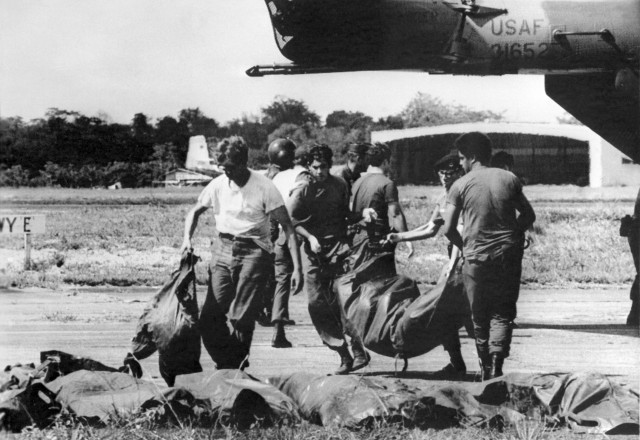"It's simply a case of unclaimed cremains at a closed funeral home," Chandler said, adding that there is no reason to believe the five unmarked containers contain remains of more Jonestown victims.
Jones moved the Peoples Temple in San Francisco in the early 1970s. He founded a free health clinic and a drug rehabilitation program, emerging as a political force. But allegations of wrongdoing mounted, and Jones moved the settlement to Guyana, the only English-speaking country in South America. Hundreds of followers moved there.
On Nov. 18, 1978, on a remote jungle airstrip, gunmen from the group ambushed and killed U.S. Rep. Leo Ryan of California, three newsmen and a defector from the group. All were visiting Jonestown on a fact-finding mission to investigate reports of abuses of members.
Jones then orchestrated a ritual of mass murder and suicide at the temple's nearby agricultural commune, ordering followers to drink cyanide-laced grape punch. Most complied, although survivors described some people being shot, injected with poison, or forced to drink the deadly beverage when they tried to resist.
After the deaths, bodies of 911 massacre victims were brought to Dover Air Force Base, home to the U.S. military's largest mortuary. Many of the bodies were decomposed and could not be identified. Several cemeteries refused to take them until the Evergreen Cemetery in Oakland, California, stepped forward in 1979 and accepted 409 bodies. The remaining victims were cremated or buried in family cemeteries.
On Thursday, the dilapidated former funeral home in Dover had a padlock on the double front doors. The building showed few signs of its former use, although a floral design was etched in glass panes at the entrance. Dead vines hung from the building's white plaster walls, and cracked windows were repaired with blue tape. Torn carpet and damaged title could be seen inside. The grass was overgrown, and out back, beer and soda cans, broken cinder blocks and empty cigarette packs littered the ground.
Funeral director Edward G. Minus Sr., 74, of Dover died in 2012, according to an obituary. The bank then took over the building. Kent County real estate records show the 54-year-old, single-story building is owned by Sunningdale Ventures Inc., a subsidiary of Eastern Savings Bank in Hunt Valley, Maryland.
A spokeswoman for Air Force Mortuary Affairs Operations at the military base didn't immediately return calls seeking comment. Dover Police Cpl. Mark Hoffman said police assume the military contracted with the funeral home to handle the remains.
Survivor Yulanda Williams, 58, called the discovery of the remains another bizarre turn of events.
"It's just so sad, for me as a survivor," said Williams, now a sergeant with the San Francisco Police Department. "You consistently wind up finding yourself trying to heal but having your wounds opened up again when new information is given."
Williams spent a decade with the temple, including three months in Jonestown. She left with her 8-month old daughter before the massacre.
"This is just another example of how these victims were further victimized," she said.
____
Associated Press writers David Dishneau in Hagerstown, Maryland; Scott Smith in Fresno, California; and Amanda Kell in Washington contributed to this report.
